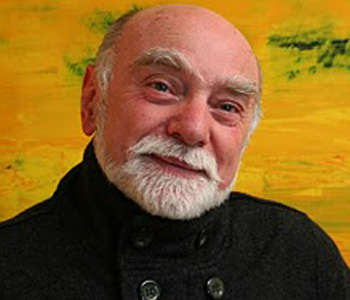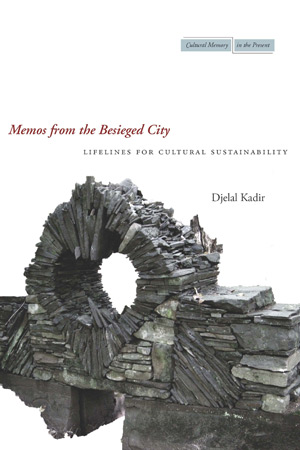
Memos from the Besieged City is a series of “reports” to and about certain cultural ancestors whose work has defined cultural traditions and practices in the humanities and human sciences.
The book’s subtitle is “Lifelines for Cultural Sustainability.” And that is because the writers I address here offer some of the most vital lifelines for the survival of human culture and humane existence.
Many of these cultural ancestors have forged their legacy for the future at their own peril—some persecuted, exiled, imprisoned, or burnt at the stake. These are lifelines that must be extended and cultivated, in turn, to ensure the sustainability of our own humanity and our legacy for future generations.
The “memos” trace the itinerary of certain key notions of literacy and culture and assess their status in the present. How well this inheritance has fared and is currently faring may indicate how well we fare into the future as a civilization.
As part of a global conversation in the ethics of intellectual commitment, the findings of this exploration are focused through the protocols of the discipline of comparative literature, broadly defined as the investigation and study of cultures and their literary traditions as they relate to each other across national formations, languages, historical periods, and geographical boundaries.
“Many of these cultural ancestors have forged their legacy for the future at their own peril—some persecuted, exiled, imprisoned, or burnt at the stake. These are lifelines that must be extended and cultivated, in turn, to ensure the sustainability of our own humanity and our legacy for future generations.”
The migration of intellectuals and academics made refugees by the politics and wars of mid-twentieth-century Europe consolidated the emergence of comparative literature as a field in the American university system and its curriculum.
A number of those literary critics and historians, known as “philologists” at the time, sought to keep alive the better part of a Western civilization whose lapse into barbarity was resulting in some of the most egregious acts of cruelty and genocide in human history.
Chief among those refugees was Erich Auerbach. After spending more than a decade at the University of Istanbul, as in exile from Nazi Germany, Auerbach immigrated to the United States in 1947, one year after publishing Mimesis: The Representation of Reality in Western Literature, a book he wrote in Istanbul.
Mimesis would become one of the defining texts of comparative literature as a discipline. And Auerbach is now identified as one of the most important figures in the history of the field as we have come to practice it.
Memos from the Besieged City begins by addressing Auerbach’s legacy, especially as he depicts, in counterpoint, the Greek and the Hebraic traditions—our dual intellectual inheritance, among other traditions we have inherited. The way Auerbach positions himself in this lineage, a position he self-consciously sketches through Montaigne, founder of the modern essay, sets the paradigm for our self-conscious practices as comparatists, observant itinerants among diverse cultures.
Memos from the Besieged City ends with a “Coda” for the Italian writer Italo Calvino—a reply to Six Memos for the Next Millennium, Calvino’s Charles Eliot Norton Lectures at Harvard in the Fall of 1985 (he died suddenly on the eve of his departure from Italy to deliver the lectures). More exactly, the “Coda” is a response to the unwritten sixth memo, “Consistency,” of Calvino’s Six Memos.
In between Auerbach’s and Calvino’s ever-present ghosts, Memos from the Besieged City moves chronologically through the last three fourths of the last millennium, and geographically around the globe, through some of the most historically significant cities that have served as nodes of cross-cultural encounters.
This itinerary extends from thirteenth-century Baghdad and that city’s until recently most notorious siege (that by the Mongols in 1258) to Constantinople, Florence, and Rome of the fifteenth century; to the Ottoman capital Istanbul, Rome, Venice, and Oxford at the end of the sixteenth century; to Paris, Mexico City and Philadelphia of eighteenth-century Enlightenment and the nineteenth-century epoch of national emancipations; to Soviet-era Poland, Holocaust-era Germany and mid-twentieth-century New York and Jerusalem; to the era of China’s Cultural Revolution and, at the beginning of the twenty-first century, the Nobel Prize for Literature for one of its victims.
At each of these historic way stations, Memos from the Besieged City communes with dissident figures who found themselves as much under siege as the city they inhabited:
the Persian Jew Rashiduddin Fazlullah writing the first “world history” in the Ghazanid court of Baghdad at the same time that Dante was composing The Divine Comedy, in flight from his native Florence;
the itinerant Nicholas of Cusa, shuttling between the Eastern Greek patriarchate in Constantinople and Papal Rome and Florence in an attempt to heal the rift between Eastern and Western Christianity;
the ill-starred Giordano Bruno, who lost out to Galileo in the competition for the professorship in mathematics at the University of Padua and, at the threshold of the seventeenth century, would be burnt at the stake in Rome;
the fugitive Fray Servando Teresa de Mier, who would escape the dungeons of the Catholic Inquisition seven times and on more than one continent;
one of Europe’s most signal poets and art critics, Zbigniew Herbert, whose prison poems Report from the Besieged City gives this book its title;
Hannah Arendt, perhaps the most uncompromising and least-forgiven ethical sensibility of the twentieth century;
Gao Xingjian, the first Nobel laureate from China, who would precipitate a diplomatic crisis with his Nobel Prize in Literature and French citizenship;
Orhan Pamuk, as enthusiastically lauded in Stockholm as Nobel laureate as he is ambivalently read and viewed with suspicion in his native country;
Italo Calvino, who continues to teach us, through Ovid and Emily Dickinson, the delicate art of misdirection in reading and writing.
I wrote the book, coincidentally enough, in the same university building and department where Erich Auerbach landed as a refugee in 1947, at Pennsylvania State University—a post from which he was fired shortly after his arrival. The xenophobias of institutionalized anti-Semitism in mid-twentieth-century America were no less virulent than those of ostensible philo-Semitism at the beginning of the twenty-first century.
The brief Epilogue of Memos from the Besieged City, like many aspects of this book, pivots on its two epigraphs. The first is from Walt Whitman’s ambiguously democratic and imperialist “Democratic Vistas” (1871); the second is from Theodor Adorno’s 1967 essay “Commitment,” a palinode to his 1949 statement on the inevitably barbaric nature of poetry after the Holocaust.
The passage cited from the latter essay reads, “Perennial suffering has as much right to expression as a tortured man has to scream: hence it may have been wrong to say that after Auschwitz you could no longer write poems.” Torture is an integral part of terror and our own age is self-defined as an age of terrorism. Poetry in the broad sense of literature–its composition and reading–may well be the most efficacious antidote to terror, whether the terror practiced by states or by non-state agents. Human history complicates such a desired role for poetry: While this desideratum has often been corroborated, poetry’s civilizing role has also been disconfirmed, with more than one torturer also having responded to the muses’ call.
The lifelines traced by Memos from the Besieged City are literary lines, more accurately, lines of literacy, or the ability to read the historical past and decipher the historical present. As re-traced quickly in the Epilogue, this book is a retelling of modes of literacy and the dangers to those throughout history who have taught us to read and write otherwise. This, at the end of the day, is the nature of true literacy—that is, critical discernment, rather than prepackaged recitation.
The “Minute on Method” recapitulates in this Epilogue a reminder of how we develop and cultivate the wherewithal to enter into and become part of the ongoing conversation–a nexus with and an articulateness about our inheritance from the past and our legacy to posterity, without which the nihilism of inarticulateness finds us at the edge of the abyss of barbarity and its familiar terrors.
“Torture is an integral part of terror and our own age is self-defined as an age of terrorism. Poetry in the broad sense of literature–its composition and reading–may well be the most efficacious antidote to terror, whether the terror practiced by states or by non-state agents.”
Memos from the Besieged City should be read as an ethical intervention in a larger conversation—larger than the strictures particular academic disciplines and their argots have imposed on our institutional and individual horizons. In this sense, it is a performative participation in what we now call “world literature,” that is, an engagement with the worlds of literature that define our world and embody the literary corpus as worldly aggregate of our cultural histories.
In the face of abhorrent political and social realities, current critical discourses may have begun to emerge from the arcane modes of highly sophisticated and self-reflective soliloquy. While we may be central to our historical and cultural consciousness, this book argues that consciousness has to be alert to more than itself.
Memos from the Besieged City is intended to be part of this ethical turn, one in which we read historical and textual realities closely and, at the same time, see the larger implications of what we perceive.
Close reading, if properly critical, is not oblivious to the more distant resonance and worldly repercussions of our acts of perception and discernment. Vigilance to this aspect of our endeavors is tantamount to an ethics of reading and writing. And Memos from the Besieged City should be read in the spirit of this alertness.


Djelal Kadir is the Edwin Erle Sparks Professor of Comparative Literature at Pennsylvania State University. Besides Memos from the Besieged City, featured in his Rorotoko interview, he has authored, among other books, Questing Fictions (1986), Columbus and the Ends of the Earth (1992), The Other Writing (1993), and co-edited the Longman Anthology of World Literature (2003; 2009) and the Comparative History of Latin American Literary Cultures (2004). Djelal Kadir is the Founding President of the International American Studies Association, a member of the Advisory Board of the American Comparative Literature Association, a Fellow and Board member of the Stockholm Collegium of World Literary History, of Synapsis: The European School of Comparative Studies, and of the Institute for World Literature.